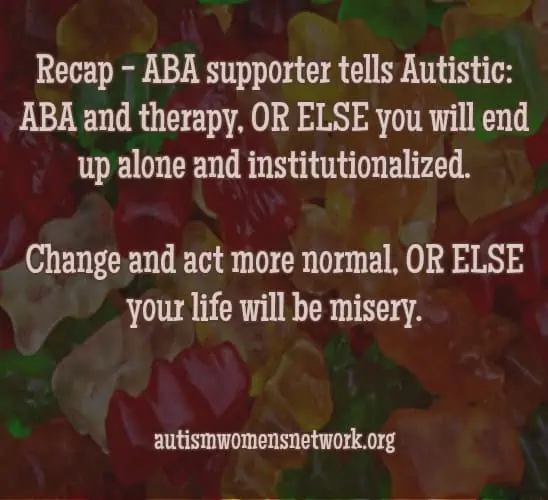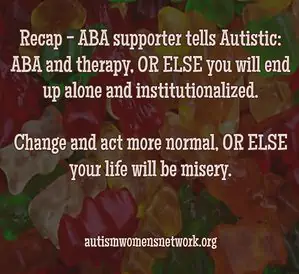
Have Some ABA, or Else…
This was the message from someone who commented on an old article I wrote, about how I don’t like ABA. Not these exact words and this person, “Mary”, could be referring to any therapy. But because it was a long exchange, and because ableism is something I can feel clearly, I could read between the lines.
I was appalled by the irony: someone who supports ABA trying to convince an Autistic person who wrote a piece

Text reads: “Recap – ABA supporter tells Autistic: ABA and therapy, OR ELSE you will end up alone and institutionalized. Change and act more normal, OR ELSE your life will be misery.”
awnnetwork.org (Image description: the back ground is an assorted variety of gummy bear candies).
citing the reasons why ABA is bad, and resorting to veiled – and open – bullying, condescending words and “advices” to make me “better”, since I wasn’t complying with her.
I want to say that I am not against all therapies. There are some approaches that can be helpful to some Autistics, still respecting our autonomy.
I also believe Occupational Therapy can be helpful if the therapist can recognize and discern between a person’s unwillingness or inability to do something, due to physical limitations, and the reason why they are not doing it.
The exchange in the comments began when someone else claimed to be ‘not Autistic anymore’ because ABA worked for them. Then “Mary” jumped in and went from agreeing with “Former Autistic” to condescension, to bullying, to the message “or else…”
About “Former Autistic”: passing is not the same as “not Autistic anymore”. Therapies are about understanding what is going on in one’s own life and taking steps to improve their quality of life – if, and how, each person chooses to. My article was about how ABA tries not to help Autistics, but to train us on how to pretend to be who we are not. Unless “Former Autistic” took their brain out, rewired it, unlearned everything they knew and learned everything again in a different way, and put the brain back in, they are still Autistic.
But “Mary” used the comments of “former autistic” to show how I should be listening to her and give it another try to “improve” myself.
She was ABA-ing me. I bet she had the gummy bears ready.
The line was crossed when, after I said I didn’t want her advice (about trying more therapies), she said that I only write because I need to make sure my self-esteem is high, and that since I was refusing more therapies, maybe I would see how wrong I am when people who help me get tired and leave, forcing me to go to an institution.
Recap – ABA supporter tells Autistic:
ABA and therapy, OR ELSE you will end up alone and institutionalized.
Change and act more normal, OR ELSE your life will be misery.
What is wrong with having, or striving for a healthy, high self-esteem? I write because I think I am good at it and yes, it makes me proud of myself when people like it. I’m not forcing anyone to read though.
Second, “Mary” was condescendingly telling me that therapies could help me learn how to “do things better” – as in dress myself without any help (between the lines she was saying that Autistics who had ABA will have a better future than me).
I want to be clear. I write about my life, and I don’t hide behind a computer. I go everywhere and I am myself wherever I go. I don’t, though, tell the world the details of my disabilities. Some things are, and will remain private.
I don’t tell the details because I have been bullied and abused because of them. What is relevant about my disabled life is that I have a good life, I am proud, and I am an activist who tries to change things through words.
I never denied that I fear being without the supports I have today because the possibility of being institutionalized would be real. But this is not because I am not having ABA. It is because of the systemic ableism that is ever present in our lives, because we are seen as not human enough. Even as I am very conscious of that, I still refuse to comply and please people who don’t value who I am.
What “Mary” doesn’t know either is if I do have therapies, which therapies I tried, and how much they helped, or didn’t help, me. She assumed I failed because I didn’t try hard enough. She cannot conceive that someone who is very disabled – like I am – can also be happy and proud, refusing to look less disabled for the comfort of the majority.
If “Mary” is an example, the legacy of ABA will be not only Autistic adults with PTSD, or abused Autistics who were never allowed to say “no”. It will also be a generation of ABA practitioners and their supporters that cannot accept when people like me speak up against the cult of compliance. It will be a generation of ABA supporters who excel in bullying Autistics.
What “Mary” said to me is what ABA practitioners say to Autistic children: do as I say, OR ELSE…
Note: the comments were deleted and “Mary” banned from commenting. I don’t mind responding to readers but the words used, the message sent by this commenter can be triggering to a lot of other Autistics, as they were to me. Comments are now going to be moderated. I think AWN made the right decision.


As an autistic who never received ABA, I never really experienced the abusive dark side of it. My mother never really knew about it, and she never really had any trouble with my stimming. (Of course, stimming for me was running up and down our home’s hallway until I was relaxed.) But, as a case study, I can say that even though I am not married currently, I have had relationships, and have passed for neurotypical about 98% of the time. She tells people at our church that “I take care of her.” I think we take care of each other.
I’m so angry that you were bullied like this in what is meant to be a safe space for Autistic people.
Beautifully said Mary. No therapy should start with “you are doing it wrong”. I walked out of ABA with my son, when they told me he didn’t have the “right to refuse”. I told them that was the most dangerous message I’d ever heard, and I was never going to support anyone who wanted to teach my child that. I’d rather he flapped and dance and paced for the rest of his, provided he knew he had complete control over his own body. I am proud of you.
Beautifully said Amy!. No therapy should start with “you are doing it wrong”. I walked out of ABA with my son, when they told me he didn’t have the “right to refuse”. I told them that was the most dangerous message I’d ever heard, and I was never going to support anyone who wanted to teach my child that. I’d rather he flapped and dance and paced for the rest of his, provided he knew he had complete control over his own body. I am proud of you.
[…] Have Some ABA, or Else… […]
Wow. I’m autistic too and the ableism of “Mary” is awful. Sometimes I think abled people can’t stand the notion of disabled people being happy because they see us like this: “Your life is not allowed to be better unless an abled person does something to make it better no matter how much harder it makes things for you.”
Good call on banning “Mary”. She’s a sad, ignorant individual. Disability isn’t a choice, but willful ignorance is.
Wonderful writing Amy, yes, you are very good at writing.
Compliance is dangerous. I just wish they could see this.
Keep writing, we need it.
Wonderfully written Amy. Your comment about the systemic abelism is so accurate in identifying the issues autistics face in navigating life. I think also that we are already seeing an inability of the ABA therapists to refuse to accept that being proudly autistic is an acceptable way of being.
Thank you for your article.
[…] Yet, today I read a post from a prominent autistic advocate that discounted her points of view and arguments on the basis of, basically, not trying hard enough to be “normal”, which in reality was code for to not be autistic. You can read the post here. […]
Wow, and people wonder why I am for the most part, allergic to “Autism Parents” and their attitudes.
Autistics with PTSD from years of ABA like therapies and do it my wat OR ELSE? Yeah, that would be me My late husband, his parents, and my father before them. All that pressure to be someone so at odds with who I really am, killed me. Nope, not even a metaphor there. I was briefly dead in 2004.
You see not only am I autistic, I have a rare genetic disorder that can be fatal, and like meltdowns can be triggered by steess and trauma. Of course a meltdown, or series of them, and burnout, on top of all the other stresses in my life at the time lead to adrenal crisis and death.
All because I lived 40 years of abuse and violence that was do it my way OR ELSE. From the time I was old enough to understand language, it was made clear to me my options were do as I was told, or be locked away forever.
So yeah, PTSD and plenty of it. Thankfully I have an autism doctor now who is also expert at helping me to heal from trauma and avoid having a trauma trigger turn into a full on meltdown and trip to the hospital. I also have a family now that loves and accepts me unconditionally. And that’s pretty amazing, a place in life I never thought I’d see. I even live alone for the first time in my life. And that is a gift too!
I try, when I can, to share my journey, what has worked, what hasn’t, and educate any who will listen. My partner is not only an awesome autism parent, she’s the best girlfriend a woman could (or has) ever had. She loves and accepts me jyst as I am, stims, AAC and all. She cheers my sucesses, accepts the things I cannot yet (and may never be able to) do, and understands how and what helps, and doesn’t. She gives me space when I need it, space, and privacy, to stim when I get overwhelmed. She lives and accepts me. Just the way I am. More people like her, and we’d have a better world. More doctors like my autism doctor, and we’d have a better world too.
This is all to common with me, and not just with ABA therapists, but often with certain insecure females (mostly in my case, I am not saying this is true of all females, it is not, nor am I saying that men do not behave similarly. just not in my experience. But as soon as I disagree with them, or even simply fail to agree, they respond all out of proportion and often very visciously (excuse my spelling). It is a symptom in my opinion of not being very comfortable, competent in their role, whatever that is. ABA is much the same. It is not about helping the Autistic person fit in even, or be less autistic and more like ‘normal’ people. It is often simply all about being more like the therapist in question. So as soonas you do not agree these therapists take it as a personal insult and react accordingly, depending on their ability to act like adecent human being, or simply an able adult, let alone a therapist. The whole ABA thing therefore for me is flawed. Not enough people have the ability to not take things personally.
Ms. Sequenzia
I very much agree with you that folks like me have much to learn from listening to people with autism. While teaching at Western Michigan Ubiversity I was involved with the initial development of ABA (late 60s to early 70s) and it took me more than 10 years to begin to listen and realize that my role should be in helping people have better lives not just better behavior – “better” being defined by them not me. While more and more of my colleagues are beginning to “come around” we need to make much more progress. To that end I have spent the last few years collecting books, magazine articles, papers, videos, audio recordings, blogs, etc. authored by people with autism. I plan to share the results of my survey to anyone who is interested and if my time and energy allow write a series of papers which summarize and analyze what people with autism have to say about topics such as ABA, more generally the obsessive interest many of us have in “changing” them, the barriers they perceive are getting in the way of them having better lives, the interest in “curing autism”, advocacy groups dominated by parents that purport to speak for people with autism, etc.
I am writing you now to find out whether you (1) would like to receive an initial listing of the sources I have identified, (2) whether you would be willing to share items you have authored or that are authored by other people with autism that aren’t already identified in the initial resource listing that I will be sharing soon.
Again I would like to express my appreciation for your work and look forward to learning more from you.
Wade Hitzing
1045 Wittman Drive
Fort Myers, Fl. 33919
239.850.1097
[email protected]
While i understand why you deleted the comments related to “Mary”, would it be possible to somehow access the comments and the back and forth. As I indicated in my comment above it is vital that ABA practitioners learn from what people with autism have to say about their work. We have spent far too much time analyzing graphs showing behavior change and almost no time asking people with autism whether they are satisfied with our work.
Thanks
Wade Hitzing
Wade Hitzing:
Is the significance of this discussion perhaps lost on you?
ABA is not a program that simply has some flaws that need to be addressed in order to improve it.
To fix ABA, arrange a mandatory meeting of all ABA therapists. At the meeting, explain to them that ABA by its very nature and intention and design will always do more harm than good, and that therefore the entire ABA system and all its programs and credentials are canceled and without value, effective immediately.
Bravo! Don’t ever let anyone keep you from being exactly who you are.
“Mary” has NOT done her research. ABA is like breaking a flute to make it sound like another instrument.
That is a good way to describe it.
[…] Have Some ABA, or Else… […]
[…] · Have Some ABA, or Else: https://awnnetwork.org/have-some-aba-or-else/ · ABA: https://unstrangemind.wordpress.com/2014/10/07/aba/ · On […]